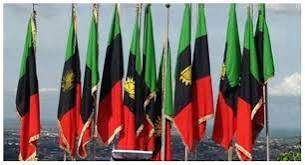Welcome To Glint News.........

IPOB Accuses BBC and Google of Conspiracy Against Nnamdi Kanu in Fresh Media War
Lagos, Nigeria – September 10, 2025
The Indigenous People of Biafra (IPOB) has launched a scathing attack on the British Broadcasting Corporation (BBC) and technology giant Google, accusing them of colluding with the Nigerian government to distort facts, criminalise its leader, Mazi Nnamdi Kanu, and undermine the movement’s struggle for self-determination.
In a statement issued on Wednesday by IPOB’s spokesperson, Comrade Emma Powerful, the group alleged that the two global institutions are deliberately linking Kanu to the alleged forgery of a death certificate relating to Ahmed Gulak, a former political adviser who was assassinated in Imo State in May 2021. IPOB described the alleged attempt as “wicked, malicious, and calculated to demonise the movement before Nigerians and the international community.”
The group recalled that when Gulak was killed in Owerri, Imo State, Governor Hope Uzodinma — the highest political authority in the state where the incident occurred — publicly stated that IPOB had no involvement in the crime, describing it instead as a politically motivated killing. IPOB argued that this official position has been conveniently ignored by both BBC and Google in their coverage, while they continue to create narratives that falsely implicate the separatist movement and its leader.
“Governor Hope Uzodinma himself openly declared that IPOB had nothing to do with the killing of Ahmed Gulak. He described the incident as purely politically motivated. Yet, BBC and Google have deliberately ignored this authoritative clarification,” IPOB said in the statement.
The movement further alleged that the promotion of such narratives is not innocent but part of a deliberate effort to justify the continued persecution of Mazi Nnamdi Kanu, who has remained in detention since his extraordinary rendition to Nigeria in 2021. Despite several court rulings affirming his rights and questioning the legality of his detention, Kanu remains incarcerated, a development that has continued to draw the attention of international human rights organisations and Biafra sympathisers across the world.
According to IPOB, the latest move by BBC and Google is an extension of the disinformation campaign that endangers Kanu’s life by conditioning public opinion and influencing judicial processes. “By repeatedly pushing this false narrative, BBC and Google have aligned themselves with the oppressive Nigerian regime that thrives on lies and persecution. These platforms are knowingly endangering the life of Mazi Nnamdi Kanu, who remains in illegal detention,” IPOB alleged.
The group did not stop there. It openly questioned the motives behind the global platforms’ actions, asking whether the intention was to shield the true perpetrators of Gulak’s assassination from public scrutiny, to provide cover for the Nigerian government’s political persecution of IPOB, or to entrench a system that ensures indigenous voices calling for freedom are permanently silenced. IPOB maintained that whichever of these motives might be true, the consequences are grave, both for the life of Kanu and for the integrity of global media institutions that are expected to remain neutral and factual.
The separatist movement therefore demanded that both BBC and Google immediately cease what it described as defamatory and dangerous publications. It warned that if such campaigns contribute to further persecution, violence, or human rights violations against Biafrans, the international community must hold these organisations accountable.
In the words of IPOB’s spokesperson, “The Indigenous People of Biafra remain a peaceful, lawful self-determination movement recognised internationally. Our leader, Mazi Nnamdi Kanu, must not be sacrificed on the altar of cheap propaganda and foreign-backed conspiracy.”
Observers note that IPOB’s allegations, though not independently verified, raise significant questions about the influence of international media and technology platforms in shaping narratives in politically charged conflicts. The group’s claims also underscore the deepening mistrust between indigenous movements and global institutions, with IPOB insisting that its struggle is being deliberately misrepresented to suppress legitimate demands for self-determination.
As of the time of filing this report, neither BBC nor Google had issued a response to IPOB’s accusations.